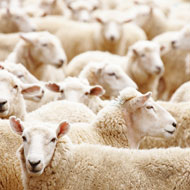Sheep industry agrees proposal on carcase splitting

Domestic regulation in the UK requires carcases to be split for the removal of the spinal cord.
Sheep industry leaders have agreed a proposal that will free lamb producers of having to implement inefficient and expensive EU regulations.
Over 30 representatives from the sheep sector and UK governments met following calls from the National Farmers Union (NFU) and the National Sheep Association (NSA).
Both organisations have been pushing for reform of the EU rules on TSEs (transmissible spongiform encephalopathies) and carcase splitting as they believe that more immediate gains can be made by changing the UK implementation of the rules.
Changes would see a switch from 'mouthing' of sheep to determine age, to a calendar date of June 30, which is already used for sheep identification purposes.
Charles Sercombe, NFU Livestock Board Chairman, said: “Carcase splitting costs our industry a huge amount of money, not just through devaluing the carcase but also time spent mouthing sheep in markets and abattoirs. It causes a great deal of uncertainty for farmers, auctioneers, processors and retailers. While we strongly believe the practice of splitting carcases is not necessary at all, an immediate improvement could be made by revisiting the way we decide whether carcases are split.”
Explaining the changes, Phil Stocker, NSA Chief Executive, said: “It is impossible to record individual birth dates for all lambs born, so this calendar date provides a clear cut-off that farmers can work to. Using this same calendar date for deciding when carcases are split will remove a great deal of confusion from the food chain.”
Current EU regulation on TSEs requires the spinal cord to be removed from sheep over 12 months of age, or which have one permanent incisor erupted through the gum.
Domestic regulation in the UK requires carcases to be split for the removal of the spinal cord. This is an interpretation of the larger EU ruling, and currently uses the mouthing of sheep as the mechanism to determine which carcases should be split.
The proposal is supported by organisations such as Eblex, The Sheep Veterinary Society and the British Meat Processors Association, amongst many more.
Defra, the Scottish Government, Welsh Government and DARD also welcome the initiative, as well as the Food Standards Agency in all four nations.



 The Veterinary Medicines Directorate (VMD) is inviting applications from veterinary students to attend a one-week extramural studies (EMS) placement in July 2026.
The Veterinary Medicines Directorate (VMD) is inviting applications from veterinary students to attend a one-week extramural studies (EMS) placement in July 2026.